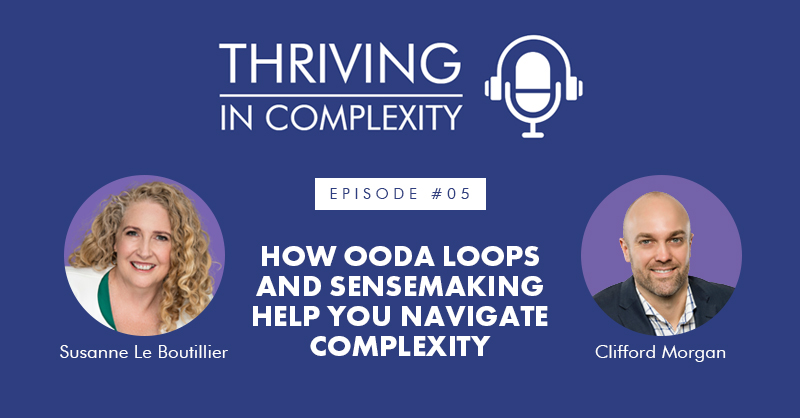Life is full of uncertainties, complexities, and constant changes. It can be compared to a battlefield where one must be trained and prepared to face whatever happens next.
With all the complexities that surround our lives, we can forget there is still value in developing a plan, while we keep looking for available options and ultimately, keeping it simple.
In this episode of the Thriving in Complexity podcast, Susanne chats with Clifford Morgan, who is an Organisational Psychologist who also served in the Royal Australian Air Force. His wealth of experience helps clients achieve personal and corporate goals and fulfil the potential of their organisations.
Clifford’s expertise is strengthened by his military background and psychology training, and he shares how this knowledge can help people become effective and transformational leaders in a changing environment. He believes that leaders have the capacity to make others a better version of themselves while helping them to navigate complexity.
If you want to know more about how you can apply proven military techniques to respond to complexity and become a coaching leader, this episode is for you!
WHAT YOU’LL DISCOVER IN THIS EPISODE:
- One interesting trivia about Clifford Morgan (02:34)
- The influences of his military background and psychology training in developing better leaders (04:00)
- The benefits of knowing how to navigate complexity (06:17)
- What is the OODA loop and how it helps deal with complex situations (09:13)
- The difference between reacting and responding (14:14)
- The value in being agile and being able to adjust (16:41)
- The challenges of transitioning from military life to civilian life (21:53)
- Major influences in Clifford’s life (23:49)
- How to become an effective leader in changing environments (25:09)
- The Coaching Leader (28:08)
- What can leaders do to become transformational leaders? (33:49)
- What does thriving in complexity mean for Clifford? (36:59)
- Clifford’s advice to his 25-year-old self (42:03)
QUOTES
“If the scenario is super complex, what we don’t want to do is to add to the complexity in order to achieve our goals, we need to simplify as much as possible.” -Clifford Morgan
“You can be a successful leader in one context, but as the context changes you’ve got to respond to that.” -Clifford Morgan
“Everything you do as a leader is an opportunity to develop your people.” -Clifford Morgan
RESOURCES MENTIONED
WHERE TO FIND CLIFFORD MORGAN
- Website: Clifford Morgan
- LinkedIn: Clifford Morgan
ABOUT CLIFFORD
Cliff has been a lifelong student of leadership. Since his teenage years, he’s always loved the topic of people and how to lead and influence them to achieve shared goals. It is part of what drove him towards a career in the military that so far spreads over 16 years.
During that time Cliff was exposed to a wide range of leadership training and experience. He worked with some of the best of leaders, ones you would willingly following into battle and take a bullet for, but he also worked with some of the worst of leaders, those you would prefer to throw a grenade under their bed while sleeping.
He has seen first-hand the effects those leaders and the quality of leadership can have on people. He’s been part of teams where poor leadership has undermined performance, eroded morale, destroyed culture, and broken people. He has seen those broken people not only fail to live up to their potential at work, but also go home unable to be the husbands, wives, mothers, and fathers that they should be. All too often this has led to broken marriages and broken families.
As a result, Cliff wages war against the perpetuation of poor leadership.
At the same time, Cliff has also served with leaders who showed the very best of what a leader could be. Those who lead in a way that transform people into better versions of themselves. Better people mean better teams and better organisations. More importantly, these ‘better people’ went home and were able to be better husbands, wives, fathers, and mothers, able to build better families, better communities, and ultimately a better world.
During his time in the Air Force, Cliff was instrumental in establishing the Air Force Leadership Coaching Program at a local level at RAAF Base Amberley. In this capacity, he coached military commanders and trained hundreds of Air Force personnel and leaders to use coaching skills to lead more effectively and be more intentional about developing people and capability.
After 8 years of full-time service, Cliff hit the books and spent eight years studying to become a fully endorsed Organisational Psychologist. Nowadays, Cliff is the Executive Director of Lumian Consulting, where he spends his time helping senior leaders and their teams pursue their potential to perform at their peak.

